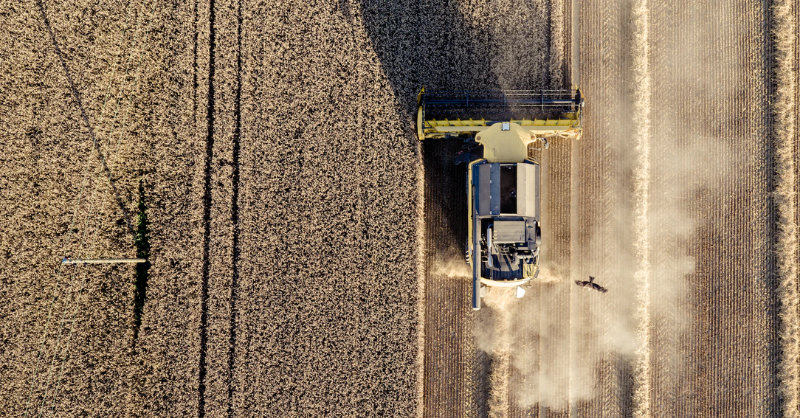
Should Agtech companies be worried about farmers right to repair?
The debate around the "right to repair" for farm machinery has been rumbling on for some time. This week we consider what it might mean for the companies that produce the specialist agricultural equipment.
Summary: The debate around the "right to repair" for farm machinery has been rumbling on for some time. Earlier in the year we looked at the topic from the perspective of the farmers. This week we turn it around and consider what it might mean for the companies that produce the specialist agricultural equipment. Being brutally realistic, the financial impact is not likely to be material.
Why this is important: For obvious reasons, the producers of sophisticated agricultural equipment would prefer that they retain control of the parts, servicing and repair process. Partly this is about the profitability of this type of work, but it's also about intellectual property and data. We expect some form of right to repair to eventually become the norm, not just in the US, but across Europe. But we expect progress to be slow. By contrast, spending on Agtech in the US has risen strongly over the last few decades, and we see no reason to believe this will decrease. In fact access to Agtech is becoming more rather than less important. Balancing out these factors, we expect that unless the right to repair movement really gains political momentum, the financial future for the Agtech companies looks positive.

The details
Summary of a release from the US National Farmers Union
The debate around giving farmers the right to repair tractors and other agricultural equipment, bypassing the dealer network, has had many twists and turns. In their opposition to Right to Repair legislation, equipment manufacturers and dealers have invoked EPA regulations and the CAA – specifically related to tampering with emissions control systems – as justification for their need to restrict repair.
But, in a letter to National Farmers Union (NFU), the Environmental Protection Agency (EPA) affirmed that the Clean Air Act (CAA) cannot be used as a basis to restrict independent repair of farm equipment. The letter specifically states that "like NFU and its members, the EPA believes barriers to the proper repair and maintenance of nonroad equipment is harmful to the environment… We support efforts by anyone to enact legislation clarifying that independent repair is allowable, provided such efforts continue to clearly prohibit illegal tampering of emissions control systems.”
Let's look at why this is important...
Why this is important
Farmers with modern tractors generally do not have access to the software and diagnostics that they need to carry out routine servicing and on site repairs. This means they are reliant on dealer networks, which can be problematic when, for instance, a combine harvester stops working during the harvest. The recent US agreement involving industry leader John Deere, and the new law in Colorado, suggests this situation might slowly be changing. But, unless change accelerates, it's hard to see this issue materially impacting the business model of the major agricultural machinery producers.
The “right to repair” issue has been a topic of debate both in and outside of agriculture. In the US, where the debate is most active, a recent memorandum of understanding (MOU) signed by Deere & Co and the American Farm Bureau Federation (AFBF) means farmers will theoretically be able to repair their own equipment. According to both Deere and AFBF, the MOU formalises the availability and access to parts, tool, software and documentation to perform repair and maintenance.
With the MOU, farmers should be able to either repair equipment on their own or go to an independent technician. It also potentially helps Deere dodge legislation around the issue. Several states had introduced their own “right to repair” legislation, but so far only one, Colorado, has succeeded. As stated in the MOU release, the agreement will happen “through a voluntary private sector commitment to outcomes rather than legislative or regulatory measures". While the initial MOU is just with John Deere, the AFBF invited other equipment manufacturers to also sign on.
As the industry, at least in the US, moves forward from the MOU, three questions will likely come to the forefront. Will this agreement slow the move toward right to repair legislation, do we expect it to undermine the financial position of the big three manufacturers (John Deere, AgCo and CNH Industrial) and (slightly left field) will it shift the spotlight to data ?
On right to repair legislation, the short answer is that progress is, in our view, less dependent on farmer lobbying than you might think. Under the MOU, the AFBF agreed to encourage state farm bureaus to "refrain from introducing, promoting, or supporting federal or state 'Right to Repair' legislation that imposes obligations beyond the commitments in this MOU." In other words, the AFBF is not expected to actively lobby for new legislation. In fact, our read is that the biggest barrier to progressing right to repair legislation is not an absence of farmer lobbying, it's politics. Which means that in the current US political environment it's hard to see much progress being made.
But, the position around the legal right to repair is only part of the equation. The other key aspect is farmers attitudes to increasingly complex equipment, and here we expect no change. Spending on agtech in the US has risen strongly over the last few decades, sitting now at c.70-80% of farm cash income. And we see no reason to believe this will slow. In fact, in developed markets, access to ag tech is becoming more rather than less important.
Take the rise of precision ag, where farmers can reduce fertiliser and pesticide use by more targeted applications. This is a growing trend. In many markets, the majority of large farm tractors (& similar equipment) come from the big 3 (John Deere, CNH Industrial, and AgCo). They control the route to market, and as long as they keep producing products that deliver what farmers what and that contribute to farm profitability, it's hard to see this changing.
Plus, one "new" area in this regard to watch is data, both its uses and its security. Access to the data that comes from tractors is a valuable commodity. As with our access to the internet, we expect farmers to accept the continuation of the status quo, so long as they keep seeing the benefits that flow from this data aggregation.
Cyber security is however a slightly different matter, highlighted by this recent research article and the older 2018 report from the US Department of Homeland Security. As this recent Medium article from two industry specialists at the University of Nebraska discusses "the advent of precision farming comes at a time of significant upheaval in the global supply chain and as the number of foreign and domestic hackers with the ability to exploit this technology continues to grow". For those with an interest in Ag tech, this is a topic that is worth tracking.
The bottom line is that in the absence of new political will, progress on right to repair for agricultural equipment in the US is likely to be slow. When you add this to the expectation of continuing growth in demand for Agtech, the long term future for the companies exposed to this theme looks positive. Many farmers and sustainability professionals would like it to be different, but unless they find a new political lever, we expect the current state of 'very limited progress' to continue.
Something a little more bespoke?
Get in touch if there is a particular topic you would like us to write on. Just for you.
Contact us
Please read: important legal stuff.

